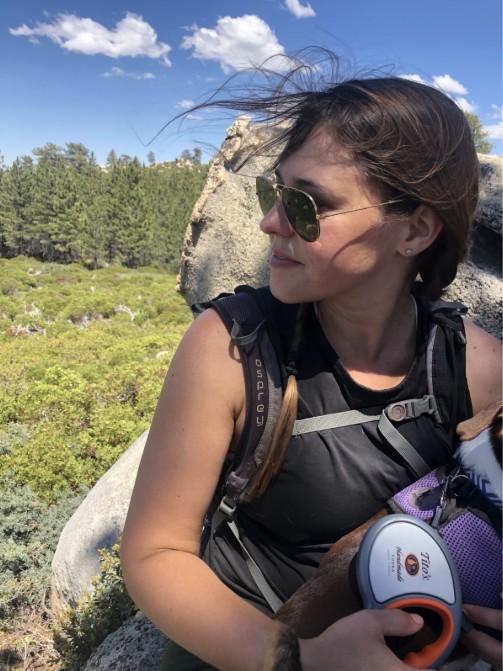20 Questions with Flint Rep Interim Artistic Director Nicole Samsel
 In February, we held a special reception at Elgood Theatre to officially welcome Nicole Samsel to the creative helm of the Flint Repertory Theatre as its Interim Artistic Director. Nicole isn’t new to FIM – this is her fourth season with Flint Rep – but folks had an opportunity to chat with her at the event to get to know her and better understand her vision for the theatre in coming months. Some other important details were shared at the reception, including the exciting kick-off to Bower Theatre renovations that will transform the venue into a multi-purpose theatre space!
In February, we held a special reception at Elgood Theatre to officially welcome Nicole Samsel to the creative helm of the Flint Repertory Theatre as its Interim Artistic Director. Nicole isn’t new to FIM – this is her fourth season with Flint Rep – but folks had an opportunity to chat with her at the event to get to know her and better understand her vision for the theatre in coming months. Some other important details were shared at the reception, including the exciting kick-off to Bower Theatre renovations that will transform the venue into a multi-purpose theatre space!
For those who couldn’t attend or haven’t had the opportunity to meet Nicole, we asked her an absurd amount of questions on your behalf, and we hope you enjoy getting to know her here. But don’t let that stop you from saying “hello” next time you’re at a Flint Rep show!
Where are you from?
St. Louis, originally. I moved to Flint from Los Angeles, but in my adult life I have worked in over six cities across the US – I started in Florida and have worked from the East Coast (New York) to the West Coast (LA) and in multiple Midwest cities.
What first sparked your interest in theatre and the arts? Is there a specific show or memory?
My mom loves musicals, so we watched a lot of them. When I was little, I saw ads for a tour of Cats that was coming through St. Louis, and I am also an animal lover, so I was thrilled when my parents took me to see it. It was so baffling, but also so magical. That was the thing that specifically inspired a love of live performance.
Who or what inspires you?
Anna Deavere Smith is an artist I have always looked up to. She’s an actress, but also an incredible playwright and performer. She was on the forefront of the documentary theatre movement, which comes from a place of understanding that people’s stories are important, and anyone’s story can be theatre. I love that she created a world where those individual stories are compelling and validated.
What’s something people might be surprised to learn about you?
In LA I owned a small business called Puggletown Pastries. I made organic human-grade dog treats that looked like human food. They had names like Beagle Bites and Pup-Tarts. I sold them at farmer’s markets and had products in five doggy daycares and seven cafés.
Do you have any hidden talents?
I’m an excellent bartender.
You have two degrees in performance – do you still perform? What was the last thing you performed?
I don’t perform much anymore because I keep pretty busy at Flint Rep, but I did sing the National Anthem at two Flint Firebirds games last season.
Do you miss performing?
I do miss it sometimes. But I have found other ways to scratch that itch over time. I’ve been in arts administration for a long time, and the people who have success in this career – the best stage managers, the best directors, the best lighting designers – they’ve learned to internalize that, when the audience applauds, it’s for them, too.
What fills your time outside of the theatre?
We have a bunch of fruit trees. We have apricots and peaches and figs and apples. Fruit trees take a lot of work, so I like spending weekends in the yard with the trees.
 Who fills your time outside of the theatre?
Who fills your time outside of the theatre?
My husband, Kevin, our two dogs, Easy-E and Stitch, and our cats, Dotty and Peewee.
Any guilty pleasures?
I really like trashy TV – “Below Deck,” “The Traitors,” “Summer House,” basically anything on Bravo.
What’s the best piece of advice you’ve ever received?
My dad’s life advice: If you never lie, you never have to remember anything. I like being an open book because I don’t have to worry about who knows what. I think transparency is really important.
What’s your favorite piece of advice to give?
If you think you’re above a job, don’t take it. And if you take a job, it’s not below you.
Can you describe one of the most challenging moments in your career so far?
Collectively, the theatre work I was doing in LA was challenging during COVID. I was lucky enough that I didn’t lose my job, and we were able to move into some audio storytelling. But so much of theatre is being in a room together. An audience changes the show. There is a palpable tension that can be felt in a space that impacts how the actors feel; it’s truly what creates a performance. It’s what I love about theatre, and it wasn’t an option.
How about your proudest moment?
There were so many times during “Godspell” (Flint Rep 2024) that I wondered if we could do it. We were dealing with the physics of water – I couldn’t force it to do what I wanted it to do. There were moments that I felt spiritually out of control. I didn’t know if we were going to pull it off, but we did. And I will be proud of it for the rest of my life.
 You’ve had a variety of administrative experiences in theatre and performance. What makes Flint Rep unique among them?
You’ve had a variety of administrative experiences in theatre and performance. What makes Flint Rep unique among them?
Flint, in general, is incredibly unique. The whole Cultural Center is so surprising to those who haven’t been here, and such a gift.
I think artists feel a lot of freedom coming here. It is a proving ground of sorts because you’re not getting the kind of scrutiny you would get in a larger market, so we can take big swings.
What’s special about the staff and artists you work with at Flint Rep?
The level of passion and integrity that people bring to their work is something that I really cherish about this place because you don’t get that everywhere.
Flint Rep presents “innovative” works of theatre. What does that mean to you? And how do you find the right balance between traditional and new works when planning a season?
I think about what stories we’re telling for Flint that can’t be told in other places. Whether that’s doing a world premiere or something that has had a life before – a classic play or musical – but finding a “newness” in it. A script can become many different things. That’s one of the great things about theatre – it’s ephemeral.
How do you balance what the community needs when programming?
Flint is at the very forefront when I plan a season. No matter how much I like a script, I always ask myself, “is this a story for Flint?” Sometimes there’s a script that’s just like a tuning fork – it really rings true for our community. Then I manifest the words that go along with that feeling to help a director or designer understand what resonates for Flint and how we can enhance those aspects.
You are in a unique position as a multi-disciplinary leader, Managing Director and Artistic Director. How do you balance creativity with practicality?
In some ways it’s easier to do both roles. I don’t think the permanent solution is having one person do everything because having moments of tension and prioritizing artistic versus business needs can create really exciting energy. But streamlining the process – passing decisions through one person instead of two – is creating space for other outside partnerships, which is especially important while planning next season.
What most excites you most about the future of Flint Rep?
The way I’m looking at next season and beyond is like a tree. We have grown an incredible trunk – we have really established who we are and what we do. And we’ve done that by focusing on high quality, innovative, professional productions. Now, I’m excited about the tree growing. We’ll start branching out from that core through community outreach, education, community partnerships, and other slightly different ways of producing. We will stay true to the tree, but those branches are where the flowers grow.